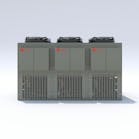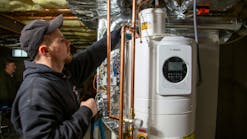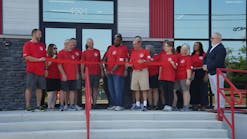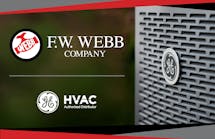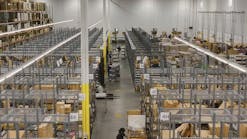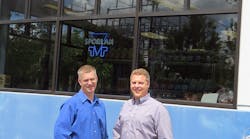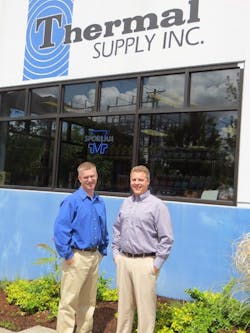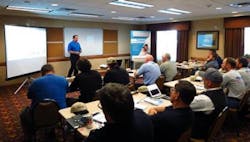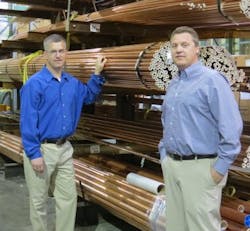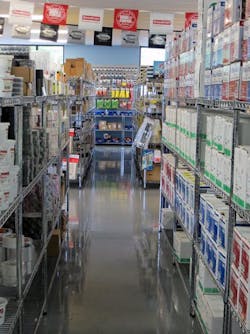For brothers Mike and Dan Monroe, the presidents of Thermal Supply Inc., the HVAC business is personal. They grew up with Thermal Supply, the family business. Their grandfather bought the business in 1970 and then sold it to his son, Bob, before they bought it from their father in 2000. With this history and with so much of their lives invested in refrigeration and HVAC, they’ve developed a great respect for the people who make up this industry.
We have the greatest people in the industry," Mike Monroe says. "Good, hard-working, honest people who are doing the best they can. We try to mirror that. It's a really good industry to be in."
Thermal Supply has come a long way since it began as a refrigeration supply house in 1947 for the commercial and industrial markets. The business is now considered a premier HVAC and HVACR wholesale distributor in the residential and commercial markets. Headquartered in Seattle, Thermal Supply has 24 branches with territory that extends from Montana to Alaska.
"We have the greatest people in the industry," Mike Monroe says. "Good, hard-working, honest people who are doing the best they can. We try to mirror that. It's a really good industry to be in."
When Wendell Monroe, the grandfather of Mike and Dan, bought Thermal Supply in 1970, it was still a refrigeration supply house with just two branches. Wendell's son, Bob, took over the business two years later and added HVAC to its inventory. He saw diversification as the clearest path for growth. It was a strategy that worked: Thermal Supply grew to 17 branches under Bob's adept leadership. Mike and Dan bought the business from him in 2000.
Mike, 47, and Dan, 49, both worked at Thermal Supply as kids, spending their summers and winter breaks in the warehouse. After college, their father encouraged them to try different roles outside the industry. Dan graduated from California Polytechnic State University and went to work as a refrigeration engineer. Mike graduated two years later from the University of Oregon and went into sales. In the early 1990s, they came back to Thermal Supply and worked their way up in the business. "I started in the role of a counter person and salesperson, became a regional sales manager and then a regional manager," he says.
As they became more involved in the business, the brothers learned from their father what drove growth: technical expertise, great customer service and strong product lines — both on the refrigeration and the HVAC side. They took in the lessons of their father, who had worked very hard to develop solid relationships with vendors and create partnerships with the best ones.
Mike and Dan followed in their father's footsteps by continuing to grow the HVAC business. "When Dan and I got involved, we knew that to continue to grow the business as we envisioned, we would have to invest heavier in HVAC," he says. "We had a significant market share of commercial refrigeration and knew we couldn't continue to grow the segment at that rate."
They were able to acquire the Goodman line and saw immediate growth in the business. They also had recently switched to Daikin. Monroe says they now have the best of both worlds.
"Taking the combined energy of these two companies is amazing," he says. "With Daikin, they're the world leader in HVAC. They're investing not only in the wholesale distribution and sales organizations in North America, but they're actually manufacturing in the United States. Goodman has been the fastest growing unitary line over the past 30 years."
Strong vendors like Goodman and Daikin have helped to grow the business, but the Monroe’s say the foundation of the business is built on the principles that make up its mission statement.
The Thermal Supply mission statement is detailed, but that's because they want their employees, customers and vendors to know what they're all about. It can be found in every branch, distribution center and the headquarters building. "Our core management team came up with it and everyone contributed to it," Monroe says. "It's long, but it's what we live by."
The mission statement focuses on providing a high level of customer service with integrity and accountability while strengthening the links in the HVAC supply chain — from the vendors and customers to its employees. It also references the goals of helping employees succeed professionally and acknowledges that the company must be ready to adapt to an ever-changing business environment.
Given its huge territory and the distance between branches, Thermal Supply faces a number of unique challenges. Transportation and inventory costs are huge, Monroe says, and they use a combination of delivery trucks and smaller shipments, or less than truckloads. "Freight and inventory management are very critical to us," he says.
All of that shipping also means more opportunities for damaged products and longer delivery times to its branch locations. To counter some of these obstacles, Thermal Supply has three distribution centers set up in strategic locations — along the I-5 corridor in western Washington, on the eastern side of the state in Spokane, and in Portland, Oregon.
The wide expanse of geography also creates challenges for Thermal Supply's sales teams. They rely on product specialists and regional sales managers to support their salespeople. Monroe says the product specialists focus on areas such as unitary HVAC, commercial HVAC, food service and refrigeration, while the salespeople and regional sales managers cover geographic territories.
He points to the counter staff as what truly sets Thermal Supply apart from the competitors within each of their markets. "We feel we have the strongest, most well-trained, experienced counter staff in the market. We hear that all the time from customers, and it's a huge advantage," Monroe says. "Our customers work with guys who truly know how each system operates and they're very sophisticated in their ability to troubleshoot."
Monroe credits their customer-focused work ethic and an ongoing training and education program for the success of the staff. "Culturally, we really set ourselves apart as technical experts," he says — that means ongoing training through a variety of methods, such as online training courses as well as in-person and online trainings from vendors like Goodman, Daikin, Copeland and Heatcraft. "They're constantly training our guys," he adds. With products constantly evolving, training is not a nice-to-have feature, it's a necessity.
Monroe acknowledges that the exclusive agreements between manufacturers and wholesale distributors are less common than in the past, which means they're often selling what the distributor down the street is selling. The knowledge, the troubleshooting and the customer service all play a larger role in setting Thermal Supply apart.
Branch managers are also a big part of this training culture that permeates Thermal Supply. Monroe notes that the branch managers have grown up within the company and understand both the technical and customer-service side of the business as well as instilling the values of Thermal Supply.
"Part of their responsibilities are to develop the counter staff,” says Monroe. “Longevity is a big part of this as well. Many Thermal Supply employees have more than 20 years of service with the business.”
Thermal Supply has a training facility in Fife, Washington, outside of Tacoma, that is dedicated to its Daikin ductless and Goodman unitary products and offers other trainings in its other facilities that typically attract anywhere from 50 to 100 contractors. "We're constantly doing trainings like that," Monroe says. "We have a certified trainer in our products group and we'll do trainings on site. We'll do whatever we can to help them be a better dealer."
With the relatively mild climate and low electricity costs in the northwest region, Thermal Supply deals with a lot of heat pumps. That plays to the company's history in refrigeration. "Our experience and knowledge in refrigeration helps us to be a better HVAC wholesaler," he says. Heat pumps are, in effect, refrigeration systems, Monroe adds. "We see ourselves as heat pump specialists. It gives us a unique expertise in the marketplace."
With a territory as large and diverse as the northwest, they came through the last recession in decent shape. From agriculture in Montana to high-tech industries in Idaho and the Seattle area and a variety of small to medium-sized businesses in between, Thermal Supply's service virtually every segment.
This diversity of geography and customers means that Thermal Supply's branch managers have a great deal of autonomy over what they choose to carry. Because many of the branch managers are from the local areas, they have a good read on the market and know where there are opportunities and where there are dead ends.
"For example, they might not have a motor shop in Twin Falls, Idaho, but there are several in Portland so we have better opportunities to sell motors in Twin Falls than we would in a larger market,” says Monroe. “We wouldn't necessarily know that sitting in an office in Portland."
Not that the Monroes are sitting around their offices. Mike Monroe works out of the Portland office, where he also serves as the regional manager, and works closely with the regional manager of the Spokane office. Dan Monroe works out of the Seattle office.
There are other divisions of labor that play to the strengths of each Monroe. With his background in sales and marketing, Mike oversees the sales and marketing function for the business. With his background in refrigeration engineering, Dan oversees the refrigeration side of the business and oversees the purchasing and operations of the organization.
Mike acknowledges the geographical and functional separation helps to keep things running smoothly between them. He and his brother know how fortunate they are to work so well together. "We have a tremendous amount of respect for one another and our co-workers."
Michael Maynard is a contributing editor based in Providence, RI. He writes frequently on HVACR, construction and architecture issues. Contact him at [email protected]
